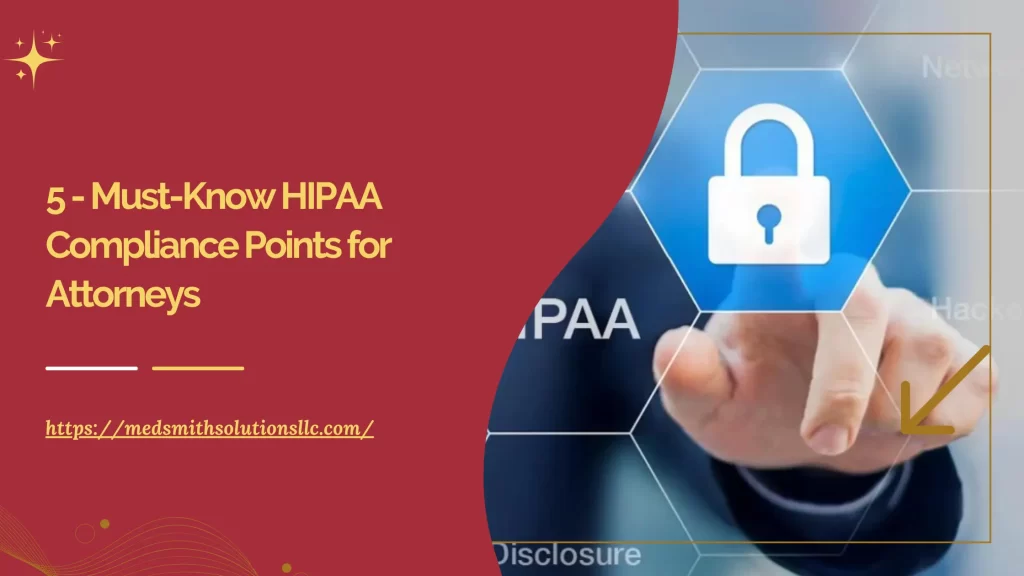
Introduction
As an attorney, especially one working in personal injury, medical malpractice, or mass tort cases, it’s crucial to understand the intricacies of HIPAA compliance. The Health Insurance Portability and Accountability Act (HIPAA) establishes strict guidelines for protecting the privacy and security of patients’ medical information.
Failure to comply with these regulations can lead to severe legal consequences, including fines, lawsuits, and damage to your professional reputation.
1. Understanding HIPAA: The Basics
HIPAA was enacted in 1996 to protect sensitive patient health information (PHI) from being disclosed without the patient’s consent or knowledge. However, attorneys representing clients in medical-related cases must also be aware of their obligations under HIPAA, especially when handling or requesting medical records.
Key Definitions:
- Protected Health Information (PHI): PHI includes any information about health status, healthcare provision, or payment for healthcare that can be linked to an individual. This includes medical records, billing information, and any other personal health data.
- Covered Entities: Healthcare providers, health plans, and healthcare clearinghouses that transmit any health information electronically.
- Business Associates: Individuals or entities that perform services on behalf of a covered entity that involves the use or disclosure of PHI. This can include attorneys, medical record review services, and other third-party service providers.
2. The Privacy Rule: Protecting Patient Information
The HIPAA Privacy Rule establishes national standards to protect individuals’ medical records and other personal health information. It requires covered entities to implement safeguards to ensure the confidentiality, integrity, and availability of PHI.
Key Points for Attorneys:
- Authorization Requirement: Attorneys must obtain written authorization from the patient or the patient’s legal representative before accessing or disclosing PHI. The authorization must specify what information can be disclosed, to whom, and for what purpose.
- Minimum Necessary Rule: Even with authorization, attorneys must ensure that only the minimum necessary PHI is accessed or disclosed to accomplish the intended purpose.
- Subpoenas and Court Orders: When requesting PHI through subpoenas or court orders, attorneys must ensure that the requests comply with HIPAA regulations. A valid subpoena or court order may still require the patient’s authorization or a protective order to safeguard the information.
3. The Security Rule: Safeguarding Electronic PHI
The HIPAA Security Rule focuses on protecting electronic PHI (ePHI). This rule requires covered entities and their business associates to implement physical, administrative, and technical safeguards to protect ePHI from unauthorized access, alteration, or destruction.
Key Points for Attorneys:
- Risk Analysis and Management: Attorneys, especially those who handle ePHI directly, should conduct regular risk assessments to identify potential vulnerabilities and implement measures to mitigate risks.
- Encryption: Encrypting ePHI is a critical safeguard that helps protect data from unauthorized access. While encryption is not explicitly mandated by HIPAA, it is considered an “addressable” specification, meaning it should be implemented if reasonable and appropriate.
- Access Controls: Implement strong access controls to ensure that only authorized individuals have access to ePHI. This includes using strong passwords, multi-factor authentication, and regularly updating access permissions.
4. HIPAA and Litigation: Navigating Legal Challenges
Attorneys often face unique challenges when navigating HIPAA compliance in litigation, especially in cases involving personal injury, medical malpractice, or mass torts. Balancing the need for evidence with the obligation to protect patient privacy can be complex.
Key Points for Attorneys:
- Protective Orders: When seeking PHI in litigation, consider requesting a protective order to limit the use and disclosure of the information. This can help protect patient privacy while allowing the necessary information to be disclosed for the case.
- De-Identification of PHI: In some cases, it may be possible to use de-identified PHI, which is not subject to HIPAA regulations. De-identification involves removing or coding personal identifiers, making it difficult or impossible to trace the information back to the individual.
- Patient Waivers: Attorneys may seek waivers from patients to allow the use and disclosure of PHI in litigation. However, waivers must be obtained voluntarily and with full understanding of the consequences by the patient.
5. Penalties for Non-Compliance: Understanding the Risks
Failure to comply with HIPAA regulations can result in severe penalties, including civil and criminal fines. The Department of Health and Human Services (HHS) Office for Civil Rights (OCR) is responsible for enforcing HIPAA compliance and has the authority to impose penalties for violations.
Key Points for Attorneys:
- Civil Penalties: Civil penalties for HIPAA violations can range from $100 to $50,000 per violation, with a maximum annual penalty of $1.5 million. The level of penalties depends on the nature and extent of the violation, the degree of culpability, and the harm caused.
- Criminal Penalties: Criminal penalties can be imposed for knowingly obtaining or disclosing PHI in violation of HIPAA. Penalties range from fines of up to $250,000 and imprisonment for up to 10 years, depending on the offense’s severity.
- Mitigating Factors: Demonstrating that reasonable steps were taken to comply with HIPAA, such as conducting regular training, implementing safeguards, and responding promptly to breaches, can help mitigate the severity of penalties.
Conclusion
HIPAA compliance is a critical aspect of legal practice for attorneys handling cases involving medical records. By understanding the key points outlined in this blog, attorneys can better navigate the complex landscape of HIPAA regulations, protect patient privacy, and avoid costly penalties. Staying informed and proactive about HIPAA compliance is essential for safeguarding client interests and maintaining a strong legal reputation.




